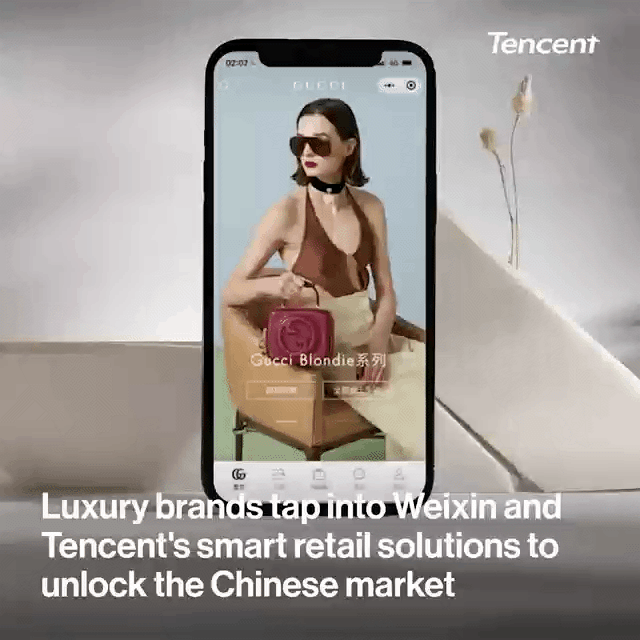Wendy Li fell in love with a designer dress after spotting a celebrity wearing it on Weixin. Eager to have it, Li dove into the brand’s Weixin Mini Program and immersed herself in a virtual runway — she tried on the dress virtually in a rainbow of colors. After an in-app consultation with a stylist, Li personalized the dress with accessories and made her purchases with Weixin Pay.
The interaction didn’t stop there. Upon receiving her dress, Li was invited to a brand-exclusive fashion webinar, shared her styled photos on Weixin Moments, and entered a contest to become a brand ambassador. Captivated by her experience, she left a glowing review.
What once seemed like a futuristic way to shop is already very much the norm for Chinese consumers, who are among the most digitally forward spenders in the world. Luxury brands are paying attention.
China’s Luxury Market to Double to $150 Billion by 2030
China’s huge luxury market has long been attractive to the world’s biggest brands. A PwC report forecast that the market will double from US$69 billion in 2023 to almost US$150 billion by 2030. A handful of factors are contributing to the boom.
Key Trends Shaping the Luxury Market in China
First, the middle class is surging. An additional 80 million individuals are forecasted to join the ranks of China’s middle class by 2030. Urbanization and rising income levels are fueling this demographic expansion.
Then there are some powerful consumer segments. A research report by Boston Consulting Group (BCG), commissioned by Tencent – “A New Chapter to Digital Future”, identifies three key consumer groups in terms of spending power:
- Heavy spenders ages 30-40, who seek high-quality products that resonate with their values
- Tech-savvy Gen Z, who are influenced by trends and online channels, and make about half of their purchases online
- Emerging consumers from Tier 2 cities and below, who make up in numbers what they might lack in individual purchasing power
Another factor contributing to the boom in China’s luxury market is the power of domestic spending. A major shift in spending habits means that more than 80 percent of luxury purchases are now made domestically rather than on trips abroad.
Finally, digital channels are driving consumer decisions. Online channels are in fact influencing more than 90 percent of shopping decisions. There are ways to stand out: Marketing campaigns that weave storytelling with detailed brand heritage or craftsmanship narratives are more effective in engaging consumers.

Leveraging Weixin and Smart Retail Solutions for Market Success
With over a billion users, Weixin is an essential platform for luxury brands wanting to connect with Chinese consumers. Features within the multifunctional ecosystem, such as Weixin Mini Programs, Weixin Official Accounts, and Weixin Pay, enhance consumer engagement and sales conversion by offering:
- Full control over brand content, user experience, and digital assets
- Direct customer interaction for personalized engagement, product launches, after-sales service, and other ways to boost brand loyalty within Weixin’s vast user base
- Optimized KOL marketing and livestreaming capabilities as part of Tencent’s smart retail solution
- Omnichannel interaction to capture customers across their entire brand journey
Smart Retail Boosts Brand Engagement
With decades of expertise in China’s local market, Tencent Cloud’s one-stop smart retail solution provides clients with customized IaaS, PaaS and SaaS systems, platform development and operation, and go-to-market insights.
Smart retail also allows luxury retailers to harness our suite of technological tools to improve sales, efficiency, and the customer experience. It’s a holistic omnichannel approach to retail and e-commerce that connects Weixin Channels, Weixin Search, enterprise communication platform WeCom, advertising services, and more with our IP in music, video, and games.
Using these strategies, global brands can expand their reach and more directly engage with Chinese consumers online and offline while maintaining brand autonomy and control.
Case Studies
1. Weixin Mini Programs Help Louis Vuitton Amplify 520 Celebrations
Engagement strategy
The 520 celebrations are a major celebration of romance in China similar to Valentine’s Day. Louis Vuitton leveraged Weixin’s Mini Program to engage consumers with a carefully curated “Art of Gifting Guide” targeting personalized gifting from the heart.
Themed scenarios within the Mini Program showcased a variety of products across price points, including bags, shoes, perfumes, and gadgets. This widened the pool of consumers able to buy into the coveted luxury house.
The smart solution
Louis Vuitton was able to harness the technical flexibility of Mini Programs to offer a highly personalized and interactive shopping experience. Features like customizable electronic gift cards allowed consumers to find the perfect present and add personal messages or audio notes.
Outcomes
The campaign successfully broadened its appeal beyond traditional romantic gifts to include family and self-gifting, thereby integrating Louis Vuitton into everyday lifestyle choices. By facilitating a seamless digital shopping experience and offering personalized products, Louis Vuitton saw strong consumer interest and likely sales conversions. The innovative use of digital tools reinforced Louis Vuitton’s position as a leading luxury lifestyle brand.
2. Virtual Experiences Elevate BOSS China’s First Concept Store Opening
Engagement strategy
European fashion powerhouse Hugo Boss opened its first BOSS concept store in China with an exciting mix of online and offline offerings. Personalized VIP invitations, AR displays, and Weixin-enabled interactive experiences allowed the brand to engage with customers through multiple touchpoints and stages of the retail process.
The smart solution
Tencent Smart Retail is working with BOSS to design and implement a smart experience journey that encompasses the retail life cycle before, during and after the store visit. Digital art installations may encourage customers to use AR technology to take and share photos, while virtual fittings allow customers to try on and combine outfits with ease. The Weixin ecosystem offers a seamless online and in-store shopping experience for consumers like never before.
Outcomes
Integrating Weixin’s digital capabilities and merging online and offline elements transformed the consumer experience by providing a dynamic shopping environment. This fosters customer engagement beyond the brick-and-mortar setting of a store.
3. Omnichannel Engagement Boosts Fila X McLaren Crossover Collaboration
Engagement strategy
Sportswear brand FILA partnered with F1 carmaker McLaren to launch a cobranded golf series. The collaboration enhanced McLaren’s fashion credentials and deepened FILA’s commitment to professional sports. New products and events combined FILA’s sportswear expertise with McLaren’s high-performance legacy to reach a new segment of elite sports consumers.
The smart solution
Weixin’s Mini Program allowed customers to connect directly with their preferred FILA store and sales associate. This enabled personalized communication and service, and facilitated seamless online-offline shopping experiences.
Using social features such as Moments and QR codes, FILA engaged customers throughout their shopping journey. WeCom’s CRM tools then allowed FILA to better understand and tailor products to consumers.
Outcomes
Weixin’s features supported activities crucial for customer retention and brand loyalty. Easy access and seamless transactions via Mini Programs boosted FILA’s sales, while CRM tools helped FILA gain valuable consumer insights.
4. Direct-to-Consumer Online Exclusives Bolster Le Labo’s First Physical China Store
Engagement strategy
Fragrance house Le Labo launched its first standalone store in the Chinese Mainland with a direct-to-consumer approach via Weixin Mini Programs. The flagship store in Shanghai emphasizes the handcrafted nature of its perfumes. At the same time, Le Labo sells exclusively through its Weixin Mini Program, avoiding third-party e-commerce platforms.
The smart solution
Le Labo’s decision to sell exclusively through Weixin Mini Programs allows it to better manage customer experiences and maintain brand integrity. Mini Program features include product customization, appointments for store visits, and a comprehensive customer service portal to facilitate seamless online and in-store experiences.
Outcomes
By using Weixin Mini Programs, Le Labo ensures that all consumer interactions align with its luxury branding and customer service standards. The exclusive sales strategy through Weixin lets Le Labo effectively tap into the lucrative Chinese market and enhances customer trust.
Tencent: The Go-To Partner for Global Luxury Brands
Tencent has helped many luxury brands to use Weixin and smart retail solutions to their advantage. Other leading brands such as Dior have hosted live fashion shows online; Ralph Lauren has successfully integrated online and offline shopping; and Valentino featured its “All Around Love” gifting campaign, all through Tencent’s platforms.
These digital tools have changed how luxury brands interact with and sell to Chinese consumers, providing great flexibility and opportunities for engagement across multiple touchpoints.
In the past six years, over 1,000 premier brands have created mini-sites within the Weixin ecosystem. Additionally, more than 600 global brands have adopted Tencent’s smart retail solutions. All top 50 global luxury brands have Weixin Official Accounts and Mini Programs. Furthermore, Tencent Cloud’s innovative solutions and business models help international brands rapidly expand their presence in China and beyond. Bottom line —Weixin is an essential platform for reaching the lucrative Chinese market.





